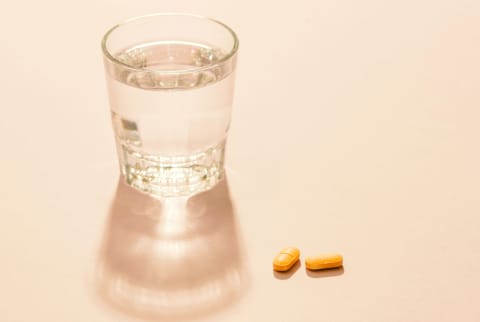Advertisement
The Supplements This Hormone Expert Can't Live Without



One of the biggest questions I encounter on a regular basis is: "Which supplements are right for me?" As a functional nutrition and hormone expert, I always stress that food comes first when we're talking about healing and health. Eating a micronutrient-rich diet of hormonally supportive foods for the right phase of your cycle is the only foolproof way to ensure long-term endocrine balance and well-being. That means there’s no single supplement that will solve all your problems.
However, many of us are dealing with conditions and complex symptoms that require additional support to speed healing. Supplements are an excellent way to help your body. The key to supplementing for your own body is to understand which vitamins and minerals you really need and what kinds of effects they'll have on your endocrine health. It's a good idea to visit your doctor or health care provider to figure out if you have any deficiencies before you start a new supplement regimen.
But as a starting point, I've developed a list of supplements that tend to help my clients again and again. Over the past 15 years of researching hormones and the endocrine system, I found that these are the five essential supplements that will elevate your hormonal healing and help you maintain endocrine excellence for the long term:
B-complex
B vitamins are necessary for good health1, and many women just don’t get enough. A deficiency in B vitamins can cause low energy and fatigue since they're so crucial for so many metabolic functions, and B6 is a particularly important vitamin that can help boost progesterone production to counteract excess estrogen (a top cause of hormonal dysfunction). B6 supports the development of the corpus luteum, which is where all your progesterone originates, and it also works with your liver enzymes to remove excess estrogen from the body and boosts the immune system.
Magnesium
Magnesium affects your pituitary health2, and without it, you produce less FSH (follicular-stimulating hormone), LH (luteinizing hormone), and TSH (thyroid-stimulating hormone), the critical hormones that signal other glands in the endocrine system to perform optimally. Low levels of those hormones can cause irregular ovulation and thyroid dysfunction, which can lead to bigger hormonal problems down the line. Magnesium is involved in over 300 catalytic reactions3 in the body, and many women are deficient in it. If you get bloated and have headaches, those are just two of many other signs that indicate a magnesium deficiency.
Liver detoxifier and estrogen metabolizer

Your liver plays a critical role in maintaining hormonal balance and keeping symptoms at bay4. In order to do all of the detoxification work it does on your hormonal behalf, your liver needs a fully stocked supply of many micronutrients and antioxidants. Antioxidants like vitamin C and alpha-lipoic acid, as well as turmeric and other essential ingredients, help keep your liver well-nourished, so it can efficiently break down excess estrogen. If your body can't efficiently process toxins like excess hormones, you'll be more likely to develop menstrual, fertility, and libido problems.
Probiotics
A healthy microbiome is essential for the management of every hormonal condition imaginable. There's a community of gut bacteria and specifically bacterial genes, called the estrobolome, that produces an enzyme that supports the metabolization of estrogen—scientists suspect that the estrobolome fosters a connection between your hormones and your gut, and have been linked to certain types of breast cancer. Your gut is an essential part of the elimination system that is vital in ushering hormones out of the body. When you eat dairy, gluten, and foods processed with pesticides (and/or take the birth control pill), you can disrupt this important bacterial balance.
D3 and omega-3 blend
Studies have linked fertility issues with vitamin D3 deficiency and shown that women with higher vitamin D3 levels are four times more likely to conceive using IVF than women with low levels. That's because a low concentration of vitamin D3 has been linked to estrogen dominance, which, as you already know, can lead to many hormonal issues. Omega-3s are also important to take along with D3 because they’re the good fat that’s essential for mood stabilization and reducing cramps. Vitamins K1 and K2 are also great for bone and heart health and collagen for skin and hair.
Whether you're trying to get rid of pesky PMS; offset the effects of synthetic birth control hormones; improve a diagnosed condition like PCOS, fibroids, etc.; or improve your fertility, talk to your health provider about what supplements you may need for healthier hormones or check out the supplements I designed specifically for hormone balance.
Want to have more mind-blowing orgasms? This technique could be the key to unlocking a better sex life and increased libido, and it works whether you're single or coupled.


















